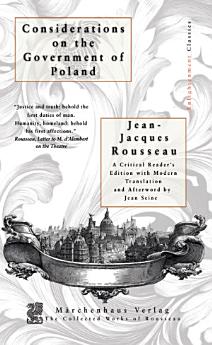Considerations on the Government of Poland
Über dieses E-Book
Considerations on the Government of Poland emerged from a specific historical request and is one of Rousseau's most practical political works. A Polish political leader commissioned it to seek advice on how to best structure and reform the Polish government. Considerations on the Government of Poland (1772) was Rousseau's attempt to apply the abstract principles of The Social Contract to concrete political problems. Rousseau, Jean-Jacques. Rousseau, Judge of ... The work was written during a critical period in Polish history when the nation was under increasing pressure from neighboring powers, particularly Russia. Poland needed to reform its political institutions to maintain independence. Unlike his more theoretical works, this treatise demonstrates Rousseau's engagement with the practical challenges of constitutional design and political reform within existing social and historical constraints. Despite its completion during his lifetime, Considerations on the Government of Poland was not published until 1782, though manuscript copies circulated from 1773.
The essay reveals Rousseau's sophisticated understanding of political realism and cultural preservation in the face of external threats. Considerations on the Government of Poland is generally considered a practical rather than philosophical work, exemplifying Rousseau's willingness to compromise his moral and political principles in the face of concrete realities and limitations. The work emphasizes the importance of national character and cultural distinctiveness as foundations for political independence. It argues that Poland must strengthen its unique institutions and customs to resist foreign domination. Rousseau advocated for gradual constitutional reform rather than revolutionary change, recognizing that Poland's survival depended on maintaining social cohesion while adapting to external pressures. Thus, the treatise stands as a testament to Rousseau's ability to balance idealistic political philosophy with pragmatic statecraft, offering concrete recommendations for education.
This modern critical reader's translation from the original French manuscripts includes supplementary materials that bring Rousseau's world and impact to life. This professional translation delivers scholarly depth with amplifying materials. This Reader's Edition includes an illuminating afterword tracing Rousseau's intellectual relationship with Diderot, Voltaire and his reception by Nietzsche, revealing the fascinating dialogue between the period's most influential minds. A comprehensive timeline connects the major events of Rousseau's life with world events, an glossary of Enlightenment terminology frames Rousseau's debates in the intellectual milieu of his day, and a detailed index provides an authoritative guide to his complete writings.











